醉翁亭记英文翻译
醉翁亭记英文版翻译

Unit10 翻译练习醉翁亭记欧阳修环滁皆山也。
其西南诸峰,林壑尤美。
望之蔚然而深秀者,琅琊也。
山行六七里,渐闻水声潺潺,而泄出于两峰之间者,酿泉也。
峰回路转,有亭翼然临于泉上者,醉翁亭也。
作亭者谁?山之僧智仙也。
名之者谁?太守自谓也。
太守与客来饮于此,饮少辄醉,而年又最高,故自号“醉翁”也。
醉翁之意不在酒,在乎山水间也。
山水之乐,得之心而寓之酒也。
Chuzhou city is surrounded by mountains. Among its southwest, woods and valley are particularly beautiful. Look from a distance, the mount filled with dense woods and beautiful deep scenery is called Langya. Walked for several miles, we will gradually hear the sound of floating water. Seeing from a distance, the spring, pouring down between the two peaks, is Niang spring. Due to the tortuous mountain, the road is following to turn off. Near the spring, there is a pavilion with four corners cocked like a bird spread its wings. That is the hut of the Old Drunkard. Who built this hut? It was the monk Zhixian. Who gave its name? The prefecture chief himself. The prefecture chief together with his friends often tipsy after drinking a little and he is the oldest one, so he calls himself the Old Drunkard. He is not interested in drinking wine but in appreciating the beautiful scenery between the hills and water. He remember this pleasure with his heart and express it to wine.若夫日出而林霏开,云归而岩穴暝,晦明变化者,山间之朝暮也。
醉翁亭记原文及翻译精编

醉翁亭记原文及翻译(实用版)编制人:__________________审核人:__________________审批人:__________________编制单位:__________________编制时间:____年____月____日序言下载提示:该文档是本店铺精心编制而成的,希望大家下载后,能够帮助大家解决实际问题。
文档下载后可定制修改,请根据实际需要进行调整和使用,谢谢!并且,本店铺为大家提供各种类型的实用资料,如小学资料、初中资料、高中资料、大学资料、文言文、中考资料、高考资料、近义词、反义词、其他资料等等,想了解不同资料格式和写法,敬请关注!Download tips: This document is carefully compiled by this editor.I hope that after you download it, it can help you solve practical problems. The document can be customized and modified after downloading, please adjust and use it according to actual needs, thank you!In addition, this store provides you with various types of practical materials, such as primary school materials, junior high school materials, senior high school materials, university materials, classical Chinese, senior high school examination materials, college entrance examination materials, synonyms, antonyms, other materials, etc. If you want to know different data formats and writing methods, please pay attention!醉翁亭记原文及翻译醉翁亭记原文及一对一翻译【作者】欧阳修【朝代】宋【原文】环滁皆山也。
《醉翁亭记》英译文赏析

艺术海岸线Artistic Coastline欧阳修(1007-1072),字永叔,号“六一居士”,庐陵(今江西吉安)人。
于宋仁宗天圣八年中进士,仕途顺利,在中央和各地做官,由翰林学士、札部侍郎,至枢密副使、参知政事。
他关心人民疾苦,力求为人民做实事,也主张文学变革和实用,是典型的政治家兼文学家。
他的散文名篇《醉翁亭记》借助骈散结合的句子,十分简洁洗练的语言,尤其是二十一个“也”字构成的一连串的解释句,生动地描写了滁州山林朝夕异趣与四时变幻的景色,表达了滁人及作者自己游历于山水之间的无限乐趣,抒发了古代儒官“与民同乐”的豪迈和得意,达到了艺术升华的境界。
他的《醉翁亭记》写得格调清丽,富有诗情画意,在我国文学史上具有很高的艺术价值。
许多中外翻译家将其译成英文。
但是,对其译本的研究则是少之又少,而本文对Giles译的《醉翁亭记》中的经典译例做了简单赏析。
一、译者简介这篇散文的英译者是英国著名汉学家和汉语典籍翻译家翟理思(Herbert A.Giles,1845-1935)。
他曾于1867年来华任英使馆翻译,对于中国文化和古典文学有精深的造诣。
他的译笔古雅流畅,且讲究散文的音韵效果和内在的节奏感;在行文和措辞上比较能照顾到中国文化词语的趣味,也深得古典散文翻译之妙。
他的翻译策略和方法,同一般所谓的“忠实于原文”的直译法和企图全面传达原语文化的“注释派”译法有天壤之别,十分讲究“入乎其中出乎其外”的功夫,足可供初学者模仿和借鉴,也值得进一步做深入研究。
二、经典译例赏析(1)环滁皆山也。
其西南诸峰,林壑尤美,望之蔚然而深秀者,琅琊也。
Giles:The district of Ch’u is entirely surrounded by hills,and the peaks to the south-west are clothed with a dense and beautiful growth of trees,over which the eye wanders in rapture away to the confines of Shantung[1].首句“环滁皆山也”是欧阳修修改后的句子。
《醉翁亭记》英译

《醉翁亭记》英译《醉翁亭记》作于宋仁宗庆历五年(公元1045年),当时欧阳修正任滁州太守。
欧阳修是从庆历五年被贬官到滁州来的。
他在滁州实行宽简政治,发展生产,使当地人过上了一种和平安定的生活,年丰物阜,而且又有一片令人陶醉的山水,便提笔写下此篇《醉翁亭记》。
中文原文:环滁皆山也。
其西南诸峰,林壑尤美,望之蔚然而深秀者,琅琊也。
山行六七里,渐闻水声潺潺,而泻出于两峰之间者,酿泉也。
峰回路转,有亭翼然临于泉上者,醉翁亭也。
作亭者谁?山之僧智仙也。
名之者谁?太守自谓也。
太守与客来饮于此,饮少辄醉,而年又最高,故自号曰醉翁也。
醉翁之意不在酒,在乎山水之间也。
山水之乐,得之心而寓之酒也。
(山之僧智仙也 一作:山之僧曰智仙也)若夫日出而林霏开,云归而岩穴暝,晦明变化者,山间之朝暮也。
野芳发而幽香,佳木秀而繁阴,风霜高洁,水落而石出者,山间之四时也。
朝而往,暮而归,四时之景不同,而乐亦无穷也。
至于负者歌于途,行者休于树,前者呼,后者应,伛偻提携,往来而不绝者,滁人游也。
临溪而渔,溪深而鱼肥,酿泉为酒,泉香而酒洌,山肴野蔌,杂然而前陈者,太守宴也。
宴酣之乐,非丝非竹,射者中,弈者胜,觥筹交错,起坐而喧哗者,众宾欢也。
苍颜白发,颓然乎其间者,太守醉也。
已而夕阳在山,人影散乱,太守归而宾客从也。
树林阴翳,鸣声上下,游人去而禽鸟乐也。
然而禽鸟知山林之乐,而不知人之乐;人知从太守游而乐,而不知太守之乐其乐也。
醉能同其乐,醒能述以文者,太守也。
太守谓谁?庐陵欧阳修也。
英文译文:The Old Drunkard’s ArbourOu-Yang ShiouThe district of Ch'u is entirely surrounded by hills, and the peaks to the south-west are clothed with a dense and beautiful growth of trees, over which the eye wanders in rapture away to the confines of Shantung.A walk of two or three miles on those hills brings one within earshot of the sound of falling water which gushes forth from a ravine, and is known as the Wine-Fountain; while hard by in a nook at a bend in the road stands a kiosque, commonly spoken of as the Old Drunkard’s Arbour.It was built by a Buddhist priest, called Deathless Wisdom, who lived among these hills; and who received the above name from the Governor himself. For the latter used to bring his friends hither to take wine; and as he personally was incapacitated by a very few cups, and was, moreover, well stricken in years, he gave himself the sobriquet of the Old Drunkard.But it was not wine that attracted him to this spot; it was the charming scenery which wine enabled him to enjoy.The sun’s rays, peeping at dawn through the trees, by-and-by to be obscured behind gathering clouds, leaving naught but gloom around, give to this spot the alternations of morning and night.The wild flowers that exhale their perfume from the darkness of some shady dell; the luxuriant foliage of the dense forest of beautiful trees; the clear frosty wind; and the naked boulders of the lessening torrent;—these are the indications of spring, summer, autumn, and winter. Morning is the time to go thither, returning with the shades off night; and although the place presents a different aspect with the changes of the season, its charms are subject to no interruption, but continue always.Burden-carriers sing their way along the road, travellers rest awhile under the trees; shouts from one, responses from another; old people hobbling along; children in arms, children dragged along by hand; backwards and forwards all day long without a break;—these are the people of Ch'u.A cast in the stream, and a fine fish taken from some spot where the eddying pools begin to deepen; a draught of cool wine from the fountain; and a few such dishes of meats and fruits as the hills are ableto provide;—these, nicely spread out beforehand, constitute the Governor’s feast.And in the revelry of the banquet hour there is no thought of toil or trouble. Every archer hits his mark, and every player wins his partie; goblets flash from hand to hand, and a buzz of conversation is heard as the guests move unconstrainedly about. Among them is an old man with white hair, bald at the top of his head. This is the drunken Governor, who, when the evening sun kisses the tips of the hills, and the falling shadows are drawn out and blurred, bends his steps homewards in company with his friends. Then in the growing darkness are heard sounds above and below: the beasts of the field and the birds of the air are rejoicing at the departure of man. They, too, can rejoice in hills and trees, but they cannot rejoice as man rejoices.So also the Governor’s friends. They rejoice with him, though they know not at what it is that he rejoices. Drunk, he can rejoice with them; sober, he can discourse with them;—such is the Governor. And should you ask who is the Governor, I reply, “Ou-yang Hsiu of Lu-ling.”。
欧阳修《醉翁亭记》原文及翻译
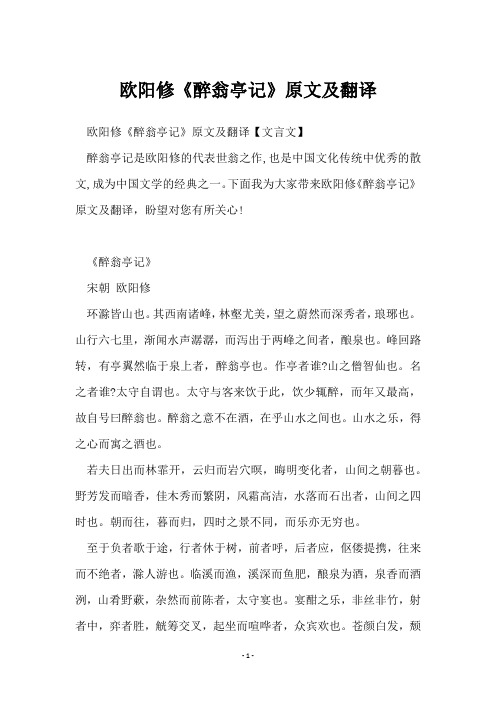
欧阳修《醉翁亭记》原文及翻译欧阳修《醉翁亭记》原文及翻译【文言文】醉翁亭记是欧阳修的代表世翁之作,也是中国文化传统中优秀的散文,成为中国文学的经典之一。
下面我为大家带来欧阳修《醉翁亭记》原文及翻译,盼望对您有所关心!《醉翁亭记》宋朝欧阳修环滁皆山也。
其西南诸峰,林壑尤美,望之蔚然而深秀者,琅琊也。
山行六七里,渐闻水声潺潺,而泻出于两峰之间者,酿泉也。
峰回路转,有亭翼然临于泉上者,醉翁亭也。
作亭者谁?山之僧智仙也。
名之者谁?太守自谓也。
太守与客来饮于此,饮少辄醉,而年又最高,故自号曰醉翁也。
醉翁之意不在酒,在乎山水之间也。
山水之乐,得之心而寓之酒也。
若夫日出而林霏开,云归而岩穴暝,晦明变化者,山间之朝暮也。
野芳发而暗香,佳木秀而繁阴,风霜高洁,水落而石出者,山间之四时也。
朝而往,暮而归,四时之景不同,而乐亦无穷也。
至于负者歌于途,行者休于树,前者呼,后者应,伛偻提携,往来而不绝者,滁人游也。
临溪而渔,溪深而鱼肥,酿泉为酒,泉香而酒洌,山肴野蔌,杂然而前陈者,太守宴也。
宴酣之乐,非丝非竹,射者中,弈者胜,觥筹交叉,起坐而喧哗者,众宾欢也。
苍颜白发,颓然乎其间者,太守醉也。
已而夕阳在山,人影散乱,太守归而来宾从也。
树林阴翳,鸣声上下,游人去而禽鸟乐也。
然而禽鸟知山林之乐,而不知人之乐;人知从太守游而乐,而不知太守之乐其乐也。
醉能同其乐,醒能述以文者,太守也。
太守谓谁?庐陵欧阳修也。
《醉翁亭记》翻译环绕滁州的都是山。
那西南方的几座山峰,树林和山谷非常秀美。
一眼望去,树木茂密,又幽深又秀丽的,是琅琊山。
沿着山路走六七里,慢慢听到潺潺的流水声,看到流水从两座山峰之间倾泻而出的,那是酿泉。
泉水沿着山峰折绕,沿着山路拐弯,有一座亭子像飞鸟展翅似地,飞架在泉上,那就是醉翁亭。
建筑这亭子的是谁呢?是山上的和尚智仙。
给它取名的又是谁呢?太守用自己的别名(醉翁)来命名。
太守和他的来宾们来这儿饮酒,只喝一点儿就醉了;而且年纪又最大,所以自号“醉翁”。
醉翁亭记 英译
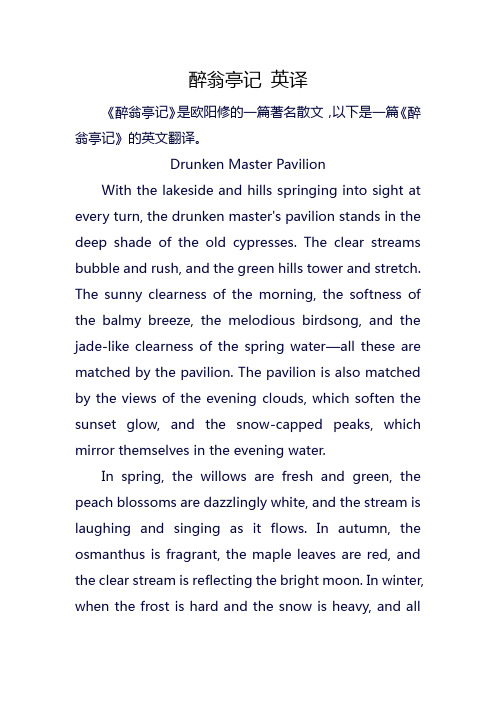
醉翁亭记英译《醉翁亭记》是欧阳修的一篇著名散文,以下是一篇《醉翁亭记》的英文翻译。
Drunken Master PavilionWith the lakeside and hills springing into sight at every turn, the drunken master's pavilion stands in the deep shade of the old cypresses. The clear streams bubble and rush, and the green hills tower and stretch. The sunny clearness of the morning, the softness of the balmy breeze, the melodious birdsong, and the jade-like clearness of the spring water—all these are matched by the pavilion. The pavilion is also matched by the views of the evening clouds, which soften the sunset glow, and the snow-capped peaks, which mirror themselves in the evening water.In spring, the willows are fresh and green, the peach blossoms are dazzlingly white, and the stream is laughing and singing as it flows. In autumn, the osmanthus is fragrant, the maple leaves are red, and the clear stream is reflecting the bright moon. In winter, when the frost is hard and the snow is heavy, and allother trees have lost their leaves, only the pine and cypress still stand, tossing in the wintry blasts.When I was at Flower Town I often went to visit a friend who lived on a hillside pavilion called "Drunken Master Pavilion." My friend was a man of letters who loved to drink and sing with his friends. He had a bookish-looking servant who was always at his beck and call. This servant used to cook for us and bring us wine and tea. We would sing and play chess under the pavilion as we looked down on the lake or up at the sky. At such times we forgot that anyone else existed in the world.Flower Town was once a famous city with many beautiful scenic spots. It has now become a ruin, but "Drunken Master Pavilion" still stands by the lakeside, like a piece of poetry written in stone, recalling memories of long ago. Whenever I visit this place I cannot help thinking of my friend of yore, and I am overcome by a feeling of emptiness and sadness.This is my record of my visit to "Drunken Master Pavilion" in Flower Town. I wrote it to show how much Ivalue my friends as well as to immortalize their memory.This record is inscribed by欧阳修。
《醉翁亭记》两个英译本的对比分析

《醉翁亭记》两个英译本的对比分析作者:徐刚来源:《青年文学家》2013年第22期摘要:《醉翁亭记》是北宋大家欧阳修的一篇著名的山水游记散文。
虽然是一篇游记,但是抒情气氛浓郁。
通过风景描绘和气氛渲染,作者表达了自己被贬至滁州后欣慰与痛苦并存的复杂心情。
这篇散文也被很多大家翻译成了英文,本文主要对比分析杨宪益夫妇和Herbert A. Giles的译本,以期发现他们的闪光与失彩之处,进而引出对翻译批评模式的几点看法。
关键词:对比分析;翻译批评模式;译文;文化;[中图分类号]:H059 [文献标识码]:A[文章编号]:1002-2139(2013)-22--03正如英国著名诗人蒲伯(Alexander Pope)在其An Essay on Criticism中写道: True ease in writing comes from art, not chance,As those move easiest who have learn’d to dance,翻译也不例外,要翻译欧阳修,理想的人选应该是英文水平大体和欧阳修的汉语水平相当才可以,如果仅仅靠着词典和语法逞蛮力,不但是害了自己还白白搭上了欧阳修。
《醉翁亭记》是一篇古文,欧阳修行文浓妆淡抹、挥散自如,不愧为宋代诗文革新运动的领袖人物。
翻译他的文章必须博古通今、中西贯通,加之是诗句化的散文,那么就要考虑到韵律、对仗等语言层面的问题,这都给译者带来挑战。
Mary Snell-Hornby[2]曾明确提出,翻译是一种“跨文化的活动”。
王佐良教授也曾指出[6]:“翻译工作者处理的是个别词,他面对的则是两大片文化。
” 古文本中的文化因素丰富,译者如果对源文本文化环境不够谙熟,就很难着手翻译,或者翻译中难免出错。
另外,对目标读者群的考虑也成为评论翻译质量的一个重要因素。
Peter Newmark [3]指出“文章逾难,译本逾丰,译法逾活,虽然源语言文本也许并不是刻意针对某个读者群、抑或只是为了自娱自乐,但是(文本的)翻译一般是以目标语言读者为服务对象的。
醉翁亭记英译
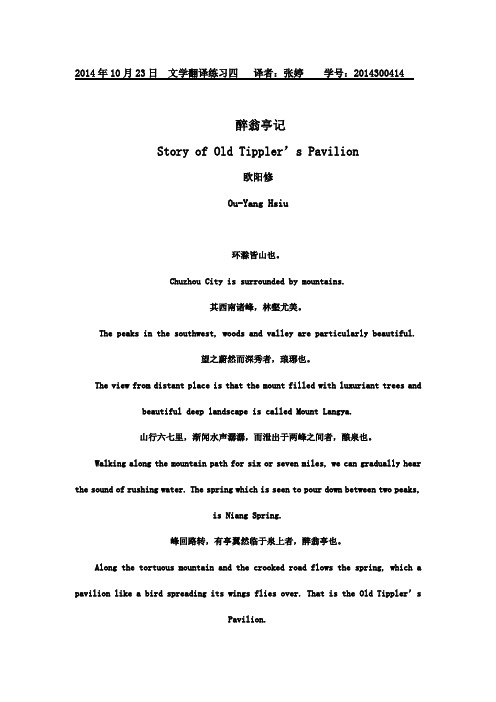
2014年10月23日文学翻译练习四译者:张婷学号:2014300414醉翁亭记Story of Old Tippler’s Pavilion欧阳修Ou-Yang Hsiu环滁皆山也。
Chuzhou City is surrounded by mountains.其西南诸峰,林壑尤美。
The peaks in the southwest, woods and valley are particularly beautiful.望之蔚然而深秀者,琅琊也。
The view from distant place is that the mount filled with luxuriant trees and beautiful deep landscape is called Mount Langya.山行六七里,渐闻水声潺潺,而泄出于两峰之间者,酿泉也。
Walking along the mountain path for six or seven miles, we can gradually hear the sound of rushing water. The spring which is seen to pour down between two peaks,is Niang Spring.峰回路转,有亭翼然临于泉上者,醉翁亭也。
Along the tortuous mountain and the crooked road flows the spring, which a pavilion like a bird spreading its wings flies over. That is the Old Tippler’sPavilion.作亭者谁?山之僧智仙也。
Who built this pavilion? He was the monk Zhixian.名之者谁?太守自谓也。
《醉翁亭记》的翻译

《醉翁亭记》的翻译《醉翁亭记》的翻译名著就是指具有较高艺术价值和知名度,且包含永恒主题和经典的人物形象,能够经过时间考验经久不衰,被广泛认识以及流传的文字作品。
能给人们以警示和深远影响的著作,以及对世人生存环境的感悟。
以下是小编为大家收集的《醉翁亭记》的翻译,仅供参考,希望能够帮助到大家!醉翁亭记(欧阳修)环滁皆山也。
其西南诸峰,林壑尤美,望之蔚然而深秀者,琅琊也。
山行六七里,渐闻水声潺潺而泻出于两峰之间者,酿泉也。
峰回路转,有亭翼然临于泉上者,醉翁亭也。
作亭者谁?山之僧智仙也。
名之者谁?太守自谓也。
太守与客来饮于此,饮少辄醉,而年又最高,故自号曰醉翁也。
醉翁之意不在酒,在乎山水之间也。
山水之乐,得之心而寓之酒也。
若夫日出而林霏开,云归而岩穴暝,晦明变化者,山间之朝暮也。
野芳发而幽香,佳木秀而繁阴,风霜高洁,水落而石出者,山间之四时也。
朝而往,暮而归,四时之景不同,而乐亦无穷也。
至于负者歌于途,行者休于树,前者呼,后者应,伛偻提携,往来而不绝者,滁人游也。
临溪而渔,溪深而鱼肥。
酿泉为酒,泉香而酒洌;山肴野蔌,杂然而前陈者,太守宴也。
宴酣之乐,非丝非竹,射者中,弈者胜,觥筹交错,起坐而喧哗者,众宾欢也。
苍颜白发,颓然乎其间者,太守醉也。
已而夕阳在山,人影散乱,太守归而宾客从也。
树林阴翳,鸣声上下,游人去而禽鸟乐也。
然而禽鸟知山林之乐,而不知人之乐;人知从太守游而乐,而不知太守之乐其乐也。
醉能同其乐,醒能述以文者,太守也。
太守谓谁?庐陵欧阳修也。
翻译环绕滁州的都是山。
那西南的几座山峰,树林和山谷尤其优美。
一眼望去树木茂盛,又幽深又秀丽的,那是琅琊山。
沿着山路走六七里,渐渐听到潺潺的水声,看到流水从两座山峰之间倾泻而出的,那是酿泉。
泉水沿着山峰折绕,沿着山路拐弯,有一座亭子像飞鸟展翅似地,飞架在泉上,那就是醉翁亭。
建造这亭子的是谁呢?是山上的和尚智仙。
给它取名的又是谁呢?太守用自己的别号(醉翁)来命名。
《醉翁亭记》英译本 赏析

译本赏析:(句法)
例:醉能同其乐,醒能述以文者,太守也。 杨译本:The governor is able to share his enjoyment with others when he is in his cups and sober again can write an essay about it.
(原文“述以文”实为“述之以文”,省略了“述”的宾语“之” 字,又把状语“以文”倒装。)
译本赏析:(韵律)
例:临溪而渔,溪深而鱼肥;酿泉为酒,泉香而酒冽。山肴 野蔌,杂然而前陈者,太守宴也。 杨译本:There the governor gives a feast...The fish are freshly caught from the stream, and since the stream is deep the fish are fat; the wine is brewed with spring water, and since the spring is sweet the wine i从句,添加主语”he”)
翟译本:Drunk, he can rejoice with them; sober, he can discourse with them,—such is the Governor.
(“drunk”和“sober”两个词做时间状语)
(1)紧缩句 (2)省略句
作者介绍: 杨宪益、戴乃迭:
翟里斯:
翟里斯 Herbert A. Giles ( 1845—1935) 是 英国的外交官、汉学家 和中国文化研究员,因 翻译中国的古典名作而 出名。他翻译了大量中 国古代思想家的作品, 如孔子和老子。
杨宪益( 1915—2009) 是我国著名的翻译家、 诗人和外国文学研究者。 他和妻子戴乃迭翻译了 《红楼梦》、全本《儒 林外史》等经典巨著, 得到了世界翻译圈的关 注及好评,产生了广泛 而长久的影响。
醉翁亭记英文版翻译

Unit10 翻译练习醉翁亭记欧阳修环滁皆山也。
其西南诸峰,林壑尤美。
望之蔚然而深秀者,琅琊也。
山行六七里,渐闻水声潺潺,而泄出于两峰之间者,酿泉也。
峰回路转,有亭翼然临于泉上者,醉翁亭也。
作亭者谁?山之僧智仙也。
名之者谁?太守自谓也。
太守与客来饮于此,饮少辄醉,而年又最高,故自号“醉翁”也。
醉翁之意不在酒,在乎山水间也。
山水之乐,得之心而寓之酒也。
Chuzhou city is surrounded by mountains. Among its southwest, woods and valley are particularly beautiful. Look from a distance, the mount filled with dense woods and beautiful deep scenery is called Langya. Walked for several miles, we will gradually hear the sound of floating water. Seeing from a distance, the spring, pouring down between the two peaks, is Niang spring. Due to the tortuous mountain, the road is following to turn off. Near the spring, there is a pavilion with four corners cocked like a bird spread its wings. That is the hut of the Old Drunkard. Who built this hut? It was the monk Zhixian. Who gave its name? The prefecture chief himself. The prefecture chief together with his friends often tipsy after drinking a little and he is the oldest one, so he calls himself the Old Drunkard. He is not interested in drinking wine but in appreciating the beautiful scenery between the hills and water. He remember this pleasure with his heart and express it to wine.若夫日出而林霏开,云归而岩穴暝,晦明变化者,山间之朝暮也。
醉翁亭记(原文英译文)
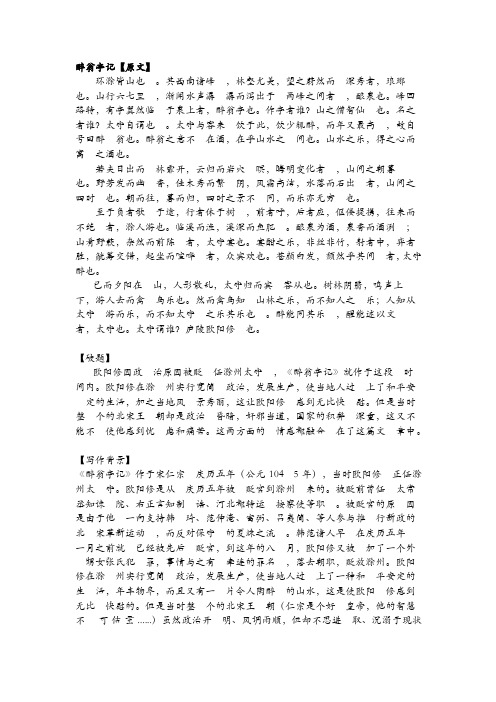
醉翁亭记【原文】环滁皆山也。
其西南诸峰,林壑尤美,望之蔚然而深秀者,琅琊也。
山行六七里,渐闻水声潺潺而泻出于两峰之间者,酿泉也。
峰回路转,有亭翼然临于泉上者,醉翁亭也。
作亭者谁?山之僧智仙也。
名之者谁?太守自谓也。
太守与客来饮于此,饮少辄醉,而年又最高,故自号曰醉翁也。
醉翁之意不在酒,在乎山水之间也。
山水之乐,得之心而寓之酒也。
若夫日出而林霏开,云归而岩穴暝,晦明变化者,山间之朝暮也。
野芳发而幽香,佳木秀而繁阴,风霜高洁,水落而石出者,山间之四时也。
朝而往,暮而归,四时之景不同,而乐亦无穷也。
至于负者歌于途,行者休于树,前者呼,后者应,伛偻提携,往来而不绝者,滁人游也。
临溪而渔,溪深而鱼肥。
酿泉为酒,泉香而酒洌;山肴野蔌,杂然而前陈者,太守宴也。
宴酣之乐,非丝非竹,射者中,弈者胜,觥筹交错,起坐而喧哗者,众宾欢也。
苍颜白发,颓然乎其间者,太守醉也。
已而夕阳在山,人影散乱,太守归而宾客从也。
树林阴翳,鸣声上下,游人去而禽鸟乐也。
然而禽鸟知山林之乐,而不知人之乐;人知从太守游而乐,而不知太守之乐其乐也。
醉能同其乐,醒能述以文者,太守也。
太守谓谁?庐陵欧阳修也。
【破题】欧阳修因政治原因被贬任滁州太守,《醉翁亭记》就作于这段时间内。
欧阳修在滁州实行宽简政治,发展生产,使当地人过上了和平安定的生活,加之当地风景秀丽,这让欧阳修感到无比快慰。
但是当时整个的北宋王朝却是政治昏暗,奸邪当道,国家的积弊深重,这又不能不使他感到忧虑和痛苦。
这两方面的情感都融合在了这篇文章中。
【写作背景】《醉翁亭记》作于宋仁宗庆历五年(公元1045年),当时欧阳修正任滁州太守。
欧阳修是从庆历五年被贬官到滁州来的。
被贬前曾任太常丞知谏院、右正言知制诰、河北都转运按察使等职。
被贬官的原因是由于他一向支持韩琦、范仲淹、富弼、吕夷简、等人参与推行新政的北宋革新运动,而反对保守的夏竦之流。
醉翁亭记的翻译译文

醉翁亭记的翻译译文(学习版)编制人:__________________审核人:__________________审批人:__________________编制学校:__________________编制时间:____年____月____日序言下载提示:该文档是本店铺精心编制而成的,希望大家下载后,能够帮助大家解决实际问题。
文档下载后可定制修改,请根据实际需要进行调整和使用,谢谢!并且,本店铺为大家提供各种类型的实用资料,如文言文、现代文、教案设计、文案大全、作文大全、词语、成语、范文、读后感、其他资料等等,想了解不同资料格式和写法,敬请关注!Download tips: This document is carefully compiled by this editor.I hope that after you download it, it can help you solve practical problems. The document can be customized and modified after downloading, please adjust and use it according to actual needs, thank you!In addition, this store provides you with various types of practical materials, such as classical Chinese, modern literature, teaching plan design, copy collection, composition collection, words, idioms, model essays, post-reading comments, and other materials. If you want to know different data formats and writing methods, please pay attention!醉翁亭记的翻译译文学生到了九年级,学习文言文时对他们的要求不只是文言知识的积累,更应该让他们了解文章的写作背景,深入理解文章的主旨。
翻译:欧阳修《醉翁亭记》

翻译:欧阳修《醉翁亭记》醉翁亭记欧阳修The Roadside Hut of the Old DrunkardOuyang Xiu环滁皆山也。
其西南诸峰,林壑尤美。
望之蔚然而深秀者,琅琊也。
山行六七里,渐闻水声潺潺,而泄出于两峰之间者,酿泉也。
峰回路转,有亭翼然临于泉上者,醉翁亭也。
作亭者谁?山之僧曰智仙也。
名之者谁?太守自谓也。
太守与客来饮于此,饮少辄醉,而年又最高,故自号曰“醉翁”也。
醉翁之意不在酒,在乎山水之间也。
山水之乐,得之心而寓之酒也。
The District of Chu is enclosed all around by hills, of which those in the southwest boast the most lovely forests and dales. In the distance, densely wooded and possessed of a rugged beauty, ngya. When you penetrate a mile or two into this mountain you begin to hear the gurgling of a stream, and presently the stream — the Brewer's Spring — comes into sight cascading between two peaks. Rounding a bend you see a hut with a spreading roof by the stream, and this is the Roadside Hut of the Old Drunkard. This hut was built by the monk Zhixian. It was given its name by the governor, referring to himself. The governor, coming here with his friends, often gets tipsy after a little drinking; and since he is the most advanced in years, he calls himself the Old Drunkard. He delights less in drinking than in the hills and streams, taking pleasure in them and expressing the feeling in his heart through drinking.若夫日出而林霏开,云归而岩穴暝,晦明变化者,山间之朝暮也。
《醉翁亭记》重点句翻译
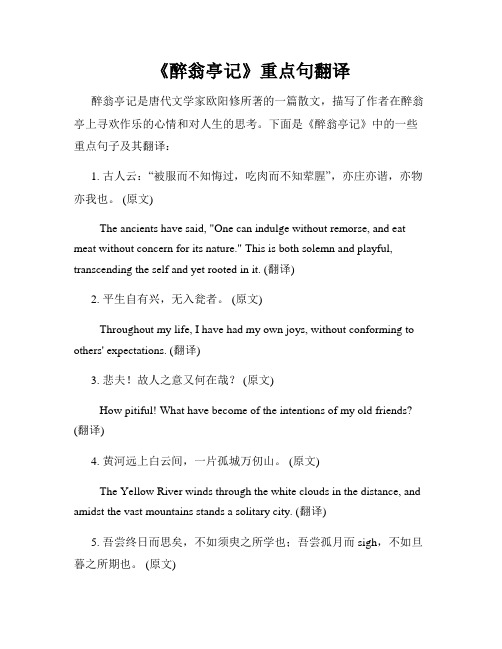
《醉翁亭记》重点句翻译醉翁亭记是唐代文学家欧阳修所著的一篇散文,描写了作者在醉翁亭上寻欢作乐的心情和对人生的思考。
下面是《醉翁亭记》中的一些重点句子及其翻译:1. 古人云:“被服而不知悔过,吃肉而不知荤腥”,亦庄亦谐,亦物亦我也。
(原文)The ancients have said, "One can indulge without remorse, and eat meat without concern for its nature." This is both solemn and playful, transcending the self and yet rooted in it. (翻译)2. 平生自有兴,无入瓮者。
(原文)Throughout my life, I have had my own joys, without conforming to others' expectations. (翻译)3. 悲夫!故人之意又何在哉? (原文)How pitiful! What have become of the intentions of my old friends? (翻译)4. 黄河远上白云间,一片孤城万仞山。
(原文)The Yellow River winds through the white clouds in the distance, and amidst the vast mountains stands a solitary city. (翻译)5. 吾尝终日而思矣,不如须臾之所学也;吾尝孤月而 sigh,不如旦暮之所期也。
(原文)I have spent whole days in contemplation, but it is not as rewarding asa moment's learning; I have sighed under the lonely moon, but it is not as fulfilling as the anticipation of dawn and dusk. (翻译)6. 八月湖水平,涵虚混太清。
醉翁亭记所有之的用法和翻译
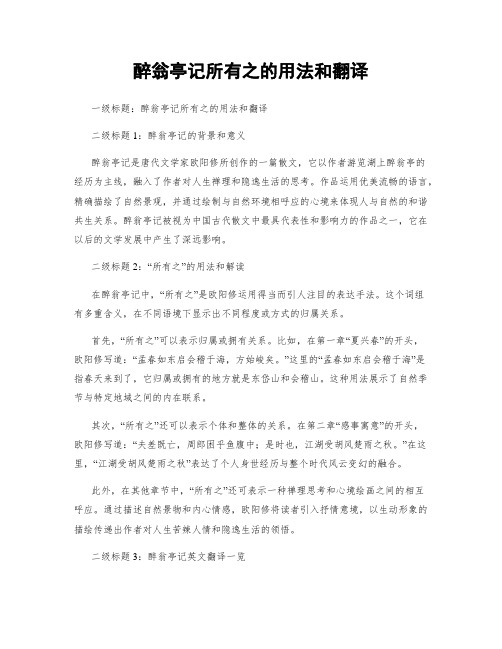
醉翁亭记所有之的用法和翻译一级标题:醉翁亭记所有之的用法和翻译二级标题1:醉翁亭记的背景和意义醉翁亭记是唐代文学家欧阳修所创作的一篇散文,它以作者游览湖上醉翁亭的经历为主线,融入了作者对人生禅理和隐逸生活的思考。
作品运用优美流畅的语言,精确描绘了自然景观,并通过绘制与自然环境相呼应的心境来体现人与自然的和谐共生关系。
醉翁亭记被视为中国古代散文中最具代表性和影响力的作品之一,它在以后的文学发展中产生了深远影响。
二级标题2:“所有之”的用法和解读在醉翁亭记中,“所有之”是欧阳修运用得当而引人注目的表达手法。
这个词组有多重含义,在不同语境下显示出不同程度或方式的归属关系。
首先,“所有之”可以表示归属或拥有关系。
比如,在第一章“夏兴春”的开头,欧阳修写道:“孟春如东启会稽于海,方始峻矣。
”这里的“孟春如东启会稽于海”是指春天来到了,它归属或拥有的地方就是东岱山和会稽山。
这种用法展示了自然季节与特定地域之间的内在联系。
其次,“所有之”还可以表示个体和整体的关系。
在第二章“感事寓意”的开头,欧阳修写道:“夫差既亡,周郎困乎鱼腹中;是时也,江湖受胡风楚雨之秋。
”在这里,“江湖受胡风楚雨之秋”表达了个人身世经历与整个时代风云变幻的融合。
此外,在其他章节中,“所有之”还可表示一种禅理思考和心境绘画之间的相互呼应。
通过描述自然景物和内心情感,欧阳修将读者引入抒情意境,以生动形象的描绘传递出作者对人生苦辣人情和隐逸生活的领悟。
二级标题3:醉翁亭记英文翻译一览醉翁亭记作为中国古代文学名篇,在英文语境下有不同版本和译本。
以下是几种常见的英文翻译:1. "Record of the Pavilion of the Drunken Old Man"(欧阳修《醉翁亭记》双语对照版):这个版本保留了“醉翁亭”和“记”的原汉字,同时添加了“Pavilion of the Drunken Old Man”的描述。
苍颜白发,颓然乎其间者,太守醉也翻译
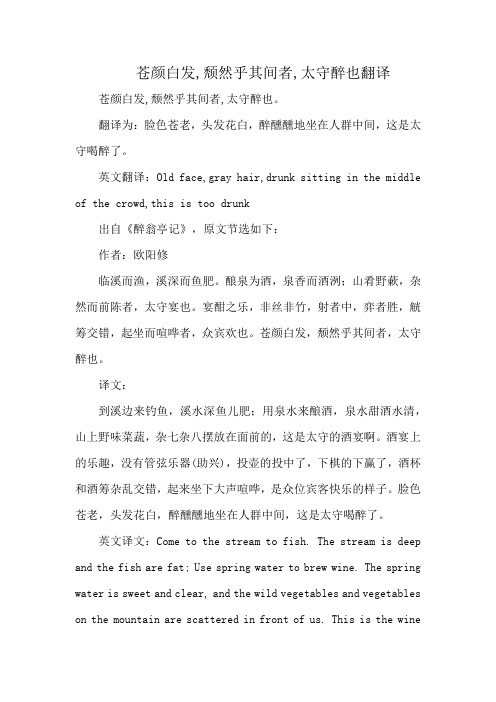
苍颜白发,颓然乎其间者,太守醉也翻译苍颜白发,颓然乎其间者,太守醉也。
翻译为:脸色苍老,头发花白,醉醺醺地坐在人群中间,这是太守喝醉了。
英文翻译:Old face,gray hair,drunk sitting in the middle of the crowd,this is too drunk出自《醉翁亭记》,原文节选如下:作者:欧阳修临溪而渔,溪深而鱼肥。
酿泉为酒,泉香而酒洌;山肴野蔌,杂然而前陈者,太守宴也。
宴酣之乐,非丝非竹,射者中,弈者胜,觥筹交错,起坐而喧哗者,众宾欢也。
苍颜白发,颓然乎其间者,太守醉也。
译文:到溪边来钓鱼,溪水深鱼儿肥;用泉水来酿酒,泉水甜酒水清,山上野味菜蔬,杂七杂八摆放在面前的,这是太守的酒宴啊。
酒宴上的乐趣,没有管弦乐器(助兴),投壶的投中了,下棋的下赢了,酒杯和酒筹杂乱交错,起来坐下大声喧哗,是众位宾客快乐的样子。
脸色苍老,头发花白,醉醺醺地坐在人群中间,这是太守喝醉了。
英文译文:Come to the stream to fish. The stream is deep and the fish are fat; Use spring water to brew wine. The spring water is sweet and clear, and the wild vegetables and vegetables on the mountain are scattered in front of us. This is the winefeast of the guard. There is no orchestral instrument for the pleasure of the banquet. The pitcher pitches, the chess player wins, the wine cup and the wine chip are mixed, and the guests get up and sit down and make a loud noise. Old face, gray hair, drunk sitting in the middle of the crowd, this is too drunk.。
- 1、下载文档前请自行甄别文档内容的完整性,平台不提供额外的编辑、内容补充、找答案等附加服务。
- 2、"仅部分预览"的文档,不可在线预览部分如存在完整性等问题,可反馈申请退款(可完整预览的文档不适用该条件!)。
- 3、如文档侵犯您的权益,请联系客服反馈,我们会尽快为您处理(人工客服工作时间:9:00-18:30)。
环绕着滁州城的都是山。
它西南方的山峰,树林和山谷尤其优美。
远远望过去树木茂盛,景色幽深秀丽的,是琅琊山。
沿着山上走六七里,渐渐听到潺潺的流水声,又看到一股水流从两峰之间飞泻而下,是酿泉。
山势回环,路随山转,有一个四角翘起,像鸟张开翅膀一样的亭子靠近酿泉边的,是醉翁亭。
建造这个亭子的人是谁?是山里的和尚智仙。
给它命名的人是谁?是太守用自己的别号给它命名的。
太守和宾客来这里饮酒,喝了一点就醉了,而且年龄又是最大,所以给自己起了个别号叫“醉翁”。
醉翁的情趣不在喝酒上,而在欣赏山水之间的美景,游山玩水的乐趣,领会在心里,寄托在喝酒上。
The story of the old drunkard pavilion
Chu Zhou is surrounded by mountains.
The forests and valleys on the southwest peak are especially beautiful.
Looking from the distance, there is the Langya Mountain, where the trees are arborous and the scenery is graceful. After a few miles’ walk along the mountain path, we can hear the bicker grows more and more clear. And there is from a spring that falls between two mountains which is called the Brewing Fountain. The path turns and twists along the mountain ridge, and a bove the spring rests a pavilion perching aloft like a bird with wings outstretched.----That i s the Pavilion of the Drunken Old Man. Who built this pavilion? Monk Zhixian, who lived i n the mountain. And who gave it name? It was the prefect,(prefecture chief in feudal China)who named it after his own alias. The prefect often comes here to drink wine with h is friends and he easily gets tipsy after a few cups. Being oldest in age among his compa nions, he calls himself "the drunken old man". The drinker's heart is not in the cup, but in the mountains and waters. The joy he gets from them is treasured in the heart, but he just express it through wine-drinking.。
